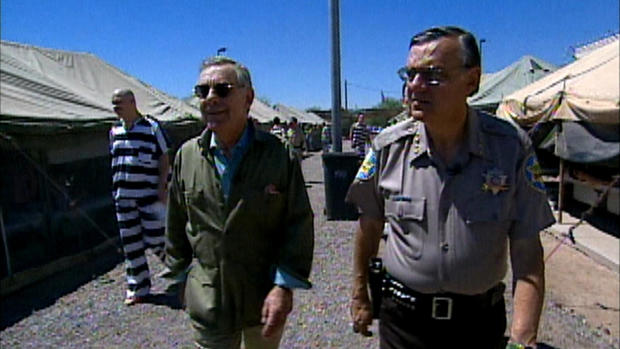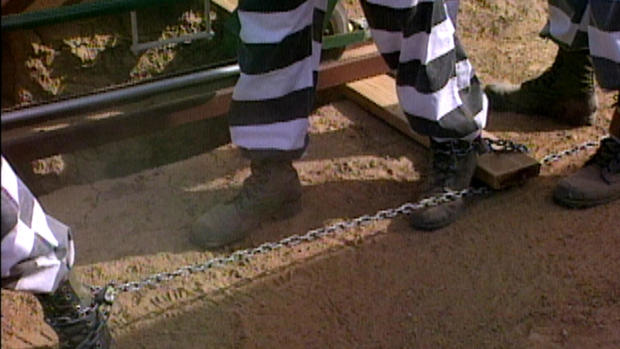60 Minutes footage shows Arpaio when he was ruthless "Joe the Jailer"
President Trump on Friday pardoned Joe Arpaio, the former sheriff of Maricopa County, Arizona. Arpaio was convicted in July of criminal contempt of court for disregarding a judge's order to stop detaining people solely on the basis of race.
While Arpaio has received nationwide attention in the last few years for his hard-line stance against illegal immigration -- and for promoting the lie that President Obama was born outside the U.S. -- he made a name for himself in Arizona years ago.
60 Minutes profiled Arpaio in 2001, when he was eight years into his tenure as sheriff of Maricopa County, Arizona. At the time, correspondent Morley Safer called him a "big-time publicity hound" who had "become famous 'round the world as just about the meanest man in the West."
His reputation in 2001 was that of a tough-as-nails jailer who believed in punishment more than rehabilitation -- and above all, in the humiliation of prisoners, reported Safer.
The Phoenix jail 60 Minutes visited with Arpaio was something of tent city, comprised of old Korean War tents with nothing to assuage the Arizona heat beyond holes in the canvas. Arpaio bragged to Safer that he spent more money on food for the jailhouse dogs than for inmates.
"They have to lose weight, too," he said of the inmates. "They're kind of heavy in there. I don't see anybody dying around here."
Arpaio got rid of the standard jailhouse uniform, dressing inmates in old-fashioned striped uniforms instead, and he used chain gangs for both male and female inmates.
Arpaio's unorthodox approach turned more than a few heads; by 2001, Amnesty International, the ACLU and the Justice Department all condemned his methods. Donna Hamm, a former judge and then-prison reform advocate, told 60 Minutes the atmosphere of humiliation in Arpaio's jails would only breed a meaner criminal.
How Arpaio came to be "Sheriff Joe" is a story in itself. Safer reported that Arpaio was a cop who later became a federal drug agent. He eventually moved to Arizona to retire but decided that helping his wife run a travel agency wasn't exciting enough. So he decided to run for sheriff.
Morley Safer's full report "Joe the Jailer" aired February 11, 2001 on 60 Minutes. His script is as follows:
MORLEY SAFER: (Voiceover) Joe Arpaio: Sheriff, jailer, big-time publicity hound. He's the sheriff of Maricopa County, Phoenix, Arizona, who's become famous round the world as just about the meanest man in the West, an image he does his best to perpetuate as the boss of five Maricopa County jails. The one we look at tonight is no Alcatraz. It houses people convicted of crimes like prostitution, probation violation, small-time drug dealing and vandalism. Most are serving sentences of under one year. Sheriff Joe believes more in punishment than rehabilitation, and above all, in humiliation. For example, he got rid of the standard jailhouse uniform and put his inmates into old-fashioned stripes--anything for a laugh at the prisoners' expense.
Unidentified Man #1: Who's to say...
SHERIFF JOE ARPAIO: I'm to say. You're in jail. You've got to remember, you are in jail. You're not walking the streets of Mesa.
SAFER: (Voiceover) It's life under the big top in Phoenix's tent city, one circus that never leaves town. Joe Arpaio, the P.T. Barnum of sheriffs, is an equal-opportunity jailer. Men and women are treated to the same miserable conditions.
ARPAIO: You're in jail; you're not in a hotel. You've got to pay your debt and that's it. That's what you're here for. I'm tired of hearing about your complaints.
Unidentified Woman #1: We are human beings.
SAFER: (Voiceover) The place festers away between a dog pound and a local garbage dump. Since he was elected sheriff eight years ago, Arpaio has made tent city into one of the strictest jails in the country...
ARPAIO: All right, gentlemen. I need to see your IDs.
SAFER: (Voiceover) ...which means no cigarettes, no coffee, no girlie magazines. Even National Geographic is doubtful. And then, of course, there's the food.
Unidentified Man #2: For two days, we've been having cheese sandwiches.
ARPAIO: Grilled cheese?
Unidentified Man #2: No, it's fake cheese.
Unidentified Man #3: No, it's vegetable oil. It doesn't even melt.
Unidentified Man #4: It turns to oil when it melts.
ARPAIO: I'm not a cook.
SAFER: You've boasted that you spend more on food for your jailhouse dogs than you do on your prisoners.
ARPAIO: I'm not going to lie about that. It's $1.15 a day for the dogs. It's only 90 to 95 cents a day for the inmates. But they get 3,000 calories. I'm on a 1,400-calorie diet. I think they can get by with 3,000.
SAFER: Yeah, because you wanted to lose a lot of weight.
ARPAIO: Well, they have to lose weight, too. They're kind of heavy in there.
I don't see anybody dying around here.
SAFER: (Voiceover) The food may not be so hot. How about the weather? As high as 120 degrees in the shade. Inmates live in old Korean War tents. The only air conditioning are the holes in the canvas.
ARPAIO: Uh-oh. Is that one there?
SAFER: That's a big hole in that one.
ARPAIO: I don't see any rain.
SAFER: (Voiceover) For prisoners who want to get away from this sweaty tedium, he offers outside work on the chain gang.
ARPAIO: (Voiceover) It's the only time they ever work together. Of course, they have to. They're hooked together. They learn discipline. They get up at 5. They have to clean their shoes. They have to have haircuts. They march, and they get on a chain gang. A great program.
SAFER: (Voiceover) And, of course, there's the flashing neon vacancy sign, a constant reminder to inmates and visitors that there's always room for one more.
ARPAIO: I will never change it to No Vacancy. Any cop or deputy sheriff wants to lock someone up, I will find room for them. There's a lot of desert from here to Mexico.
SAFER: (Voiceover) An attitude that has proved irresistible to a string of get-tough Republicans: Bob Dole, Pete Wilson and George W., all perhaps suffering from poll envy. Joe's approval
rating hovers at 85 percent. And a delegation that doesn't give a damn about polls: Chinese law enforcement officials drop in for some tips from Joe, who just brushed up on his Mandarin.
ARPAIO: I hear China very tough on criminal, correct, huh? I'm asking them, 'In China...
Unidentified Woman #2: Yes?
ARPAIO: ...do they put women...on a chain gang?
Unidentified Man #4: No.
Unidentified Man #5: No.
Sheriff ARPAIO: Ah, thank you. I am still the first in the world. If I was appointed, I would have been fired seven years ago.
SAFER: Why?
ARPAIO: Because in government, the famous word is, 'You can't.' 'You can't do this, you can't do that. We're going to be sued.' You have to report to somebody. I report to the people, three million people. I love reporting to the people.
SAFER: (Voiceover) From the Biltmore Fashion mall to the Civic Center, a lone man strolls the West, assuring the settlers.
Unidentified Man #6: You're doing a great job.
ARPAIO: Thank you.
Unidentified Man #6: Keep doing it. I like it.
Unidentified Woman #3: Keep up the good work, Joe.
Unidentified Woman #4: Yeah.
SAFER: (Voiceover) With only a six-gun on his belt, and occasionally a tank.
Unidentified Man #7: Keep it up, Joe!
SAFER: (Voiceover) And nowhere do they love him more than in places like Sun City, a vast retirement complex...
ARPAIO: I love Sun City.
SAFER: (Voiceover) ...where Joe unashamedly panders to older people's fear and vulnerability, the George Patton of the Ponderosa.
ARPAIO: So what's wrong with using the word punishment?
Mr. DAVID LIEBOWITZ: The sheriff has figured out something that very few law enforcement people have figured out. He has a group of people to pick on that nobody gives a damn about.
SAFER: (Voiceover) Arizona Republic columnist and radio talk show host David Liebowitz says that Arpaio is so popular because he provides a little public humiliation, a 21st-century version of a Roman circus.
Mr. LIEBOWITZ: And the voters seem to take it that way, too. It's almost as if they've decided, you know, 'I really can't stop crime in my neighborhood, and I really can't stop being afraid. I might as well get some entertainment value out of the deal.'
SAFER: (Voiceover) And citizens have become part of it. He's formed posses to track down deadbeat dads, prostitutes and pet abusers. And then there's his jailhouse dog patrol, he calls the 'puparazzi.'
Mr. LIEBOWITZ: They actually strapped little miniature cameras to dogs to have them roam the perimeter fence to guard against people tossing contraband over the fence. I mean, it's theater of the absurd, day in and day out.
SAFER: (Voiceover) For entertainment, the sheriff did allow C-SPAN, the Weather Channel, and G-rated movies.
SAFER: (Voiceover) But when inmates cheered the death of the dog in "Old Yeller," Arpaio decided to retaliate with cruel and unusual punishment.
SAFER: (Voiceover) Joe Arpaio's "Bedtime Stories"...
ARPAIO: Good evening, inmates.
SAFER: (Voiceover) ...where he introduces some of his favorite books on tape. Like Newt
Gingrich's 10-part lecture on American Civilization and John Gray's "Men Are From Mars, Women Are From Venus."
ARPAIO: Check out a book. I have the dog with the fireplace, my Mr. Rogers sweater. And I say, 'Dear inmates, this is your book of the evening.' Good night. See you tomorrow. Say good night, Nitro.
Ms. DONNA HAMM: There isn't a social scientist or a professional criminologist or a corrections professional that would tell you that anything he does has anything whatever to do with correcting human behavior or protecting the public.
SAFER: (Voiceover) Donna Hamm, a former judge who now works as a prison reform advocate, says there's a destructive side to the fun and games, that the humiliation will only breed a meaner criminal.
Ms. HAMM: They won't react against their keepers because they can't, but they will go out into the Safeway parking lot and they're going to be attacking the little old lady who is defenseless, just like they were in Joe Arpaio's jail.
SAFER: Ms. Hamm points to an Arizona State University study commissioned by the sheriff which shows that his methods have had virtually no effect on repeat crimes in Maricopa County. But it's not only Donna Hamm who has a problem with Sheriff Joe. Amnesty International, the ACLU and the Justice Department have all condemned his methods. But the sheriff seems to love condemnation as much as praise.
Mr. LIEBOWITZ: There's no such thing as a negative glow. All there is is a glow and like a moth, he is attracted to it at all times.
SAFER: (Voiceover) Liebowitz says that Arpaio's stunts show a genius for self-promotion, with his gimmicks almost guaranteed to make it on all five local evening news broadcasts.
Mr. KRIS LONG (News Anchor): Sheriff Arpaio announced that dogs rescued by his so-called pet posse would be provided with air conditioning and given better foods than human inmates.
Mr. LIEBOWITZ: The local TV stations, they just love this guy. And they'll cover anything that he does. It's the "Joe Show," 24 hours a day, seven days a week.
SAFER: (Voiceover) Joe Arpaio was born 68 years ago in Springfield, Massachusetts. He was a cop and then a federal drug agent for years before heading to Arizona to retire. When he decided that helping his wife run a travel agency wasn't exciting enough, he decided to run for sheriff.
Mr. LIEBOWITZ: This guy spent 30 years as an undercover agent with the DEA. He had these wonderful exploits in Turkey and on the streets of Chicago and Massachusetts and everyplace else that he went. And he couldn't tell anybody about it. He was so desperate for attention. I mean, this is a deep-seated need that has to date back to childhood or something. There's no other way to explain it.
SAFER: (Voiceover) Many police officers in surrounding areas explain it by saying he's an ego-driven buffoon. Steve Benson is a part-time officer.
OFFICER STEVE BENSON: He generates a lot of passion on the part of civilians, on a superficial level, but I don't believe it's really effective crime-fighting. He does to prisoners what the average Joe and Jane wishes they could do. But in terms of actually making a dent in crime, I think he is all hat and very little pony.
SAFER: (Voiceover) But in his day job as editorial cartoonist for the Arizona Republic, Benson feels Joe Arpaio is sent straight from heaven.
Off. BENSON: Absolutely. Fellows like this only come by once in a millennium.
SAFER: And made for people like you?
Off. BENSON: (Voiceover) And made for cartoonists. I tell you, you know, when I do a cartoon on the issues, what's Sheriff Joe's response? 'You draw me too fat.' I'm glad that we're focusing on the issues.
ARPAIO: He doesn't know that I lost 50 pounds. He insults me, he makes me look like this. I have taken 50 enemas to lose this weight, and he still makes me look like I'm a 500-pound sheriff.
Unidentified Woman #5: You've lost some weight recently.
ARPAIO: I want to be a slimmer target. I got guys trying to shoot me down everywhere.
SAFER: (Voiceover) Joe Arpaio never met a camera crew he didn't like. He boasts he never turns down an interview. And he and a PR staff of three work overtime promoting this modest county sheriff who's written a book, has a radio talk show and has signed a movie deal, and who, by the way, has cost the county and its insurers nearly $15 million in lawsuits involving treatment of prisoners.
Ms. HAMM: You only have to let your staff know that you will support a certain philosophy, and the staff will take it from there. And if that means beating someone to death or choking them and covering it up, that's what they will do. And so you don't have to be standing there watching it to approve of it.
SAFER: (Voiceover) She's referring to the case of Scott Norberg, an inmate who was killed in jail after being beaten and gagged. The county's insurance company paid the Norberg family over $8 million to settle the case. It was a pretty brutal case.
ARPAIO: No, it wasn't brutal. You--you believe everything you see on TV?
SAFER: But your critics would say that the Norberg case may be an example that the sheriff sets the tone. The sheriff's a tough guy, and that tends to give kind of license to abuse to the guys who work for you.
ARPAIO: Well, I tell you, you know, I--we don't like to lose anyone in jail, anyone to die in jail. We don't like that. But when you look at this Norberg situation, when you have one person die out of 800,000 that came through my jail system, I can't even figure what percentage, how--how to figure that.
SAFER: (Voiceover) Despite the Norberg case and other successful lawsuits alleging abuse, the people still love Sheriff Joe. As expected, he was elected to a third term last November. His poll numbers are so consistently high that there's even been talk of his running for governor. But he dismisses it.
ARPAIO: Yeah, it's probably a demotion. Why should I go from sheriff to governor? I don't see you talking to the governor; you're talking to me. So I get more press in one week than the governor gets in 20 years. They're getting their 2,800 calories.
SAFER: (Voiceover) For now, Joe Arpaio seems content with being a man whose 15 minutes of fame may last a lifetime. Will it wear out? Acts have a beginning, a middle, and an end.
Mr. LIEBOWITZ: It's going to wear out when this guy passes away, giving a speech in Sun City at 9:00 at night and slumps forward into his rubber chicken. That's when it'll wear out and not a moment before. [END]





